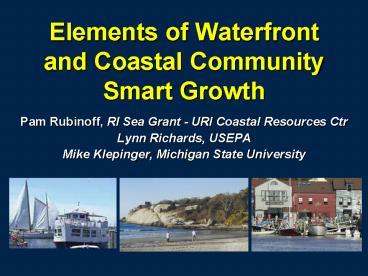Elements of Waterfront and Coastal Community Smart Growth - PowerPoint PPT Presentation
1 / 17
Title: Elements of Waterfront and Coastal Community Smart Growth
1
Elements of Waterfront and Coastal Community
Smart Growth
- Pam Rubinoff, RI Sea Grant - URI Coastal
Resources Ctr - Lynn Richards, USEPA
- Mike Klepinger, Michigan State University
2
Context for Coastal Principles
- Smart Growth Principles (1996)
- Ten Principles of Smart Growth
- What is smart in our coastal community?
- CZM act (1972)
- Preserve, protect, enhance and restore
- Balance competing interests
- Public Trust Doctrine (Roman Empire...)
- Public resource held in trust for all citizens
- Navigation, commerce, fishing, recreation and
similar public uses
3
- Common currency common language
- Sharing needs and aspirations
- Tool for coastal constituencies to advance their
common causes and interests nationwide
4
Smart Growth Principles present key
characteristics for development
Waterfront and Coastal Smart Growth Elements
distill the key aspects of Smart Growth
Principles to help communities address their
unique waterfront advantage
5
Welcome to the City by the Sea.....
6
- Mix Land Uses
- Encourage working waterfronts and water
dependent uses that promote a stable, year-round
waterfront community
7
- Take advantage of compact building design
- Effectively use land to maximize waterfront
and water-based activities in appropriate areas
8
- Create a range of housing opportunities and
choices - Accommodate seasonal population
fluxes while retaining the livability and
affordability of the community.
9
- Create walkable neighborhoods
- Assure physical and visual access
to and from the waterfront for the public
The public shall continue to enjoy and freely
exercise all the rights of fishery, and the
privileges of the shore, to which they have been
heretofore entitled under the charter and usages
of this State. RI Constitution
10
- Foster distinctive, attractive communities with a
strong sense of place - Protect, preserve, and enhance coastal
character while capturing local opportunities for
growth
11
- Preserve open space, farmland, natural beauty and
critical environmental areas - Protect natural coastal features and processes
by designing with respect for the sea and the
land-sea interface
12
- Strengthen and direct development towards
existing communities - Encourage revitalization of waterfronts
13
- Provide variety of transportation choices
- Encourage waterborne transportation options to
compliment to land-based options
14
- Make development decisions predictable, fair, and
cost-effective - Facilitate state and federal waterfront permit
processing at the local level
Special Area Management Plan
15
Encourage community and stakeholder
collaboration in development decisions
Seek participation from diversity of sectors
to represent the values and legacy of the public
trust of coastal waters
16
Putting Principles into Practice
- Non-regulatory
- guidelines, incentives, partnerships
- Outreach, education, extension
- demonstrations, training, pubs
- technical assistance
- Regulatory
- policy, state regs,
- local zoning, permitting
17
http//seagrant.gso.uri.edu/ccd/
Pam Rubinoff, RI Sea Grant rubi_at_gso.uri.edu Lynn
Richards, US EPA richards.lynn_at_epa.gov Mike
Klepinger, MI State University klep_at_msu.edu































